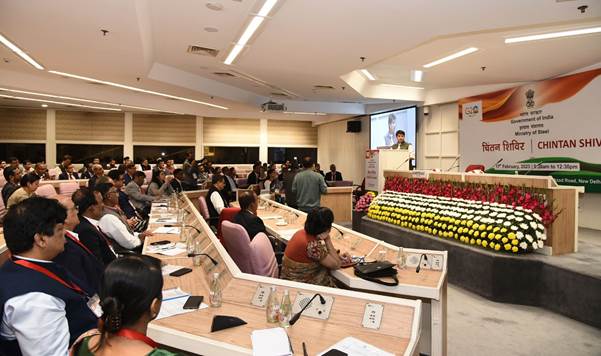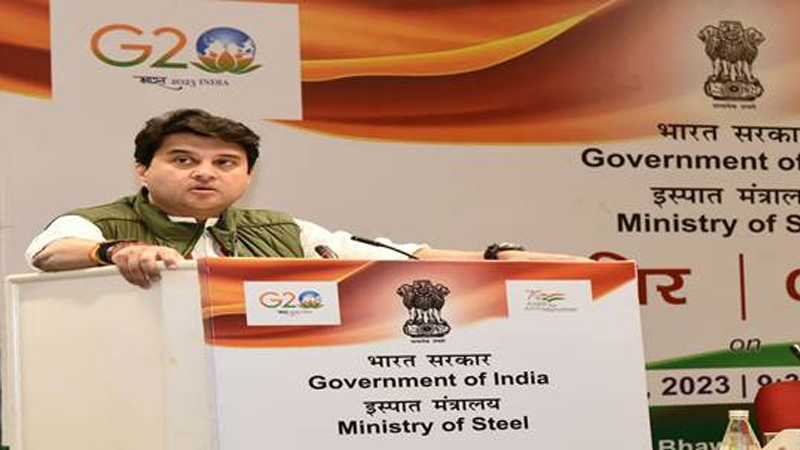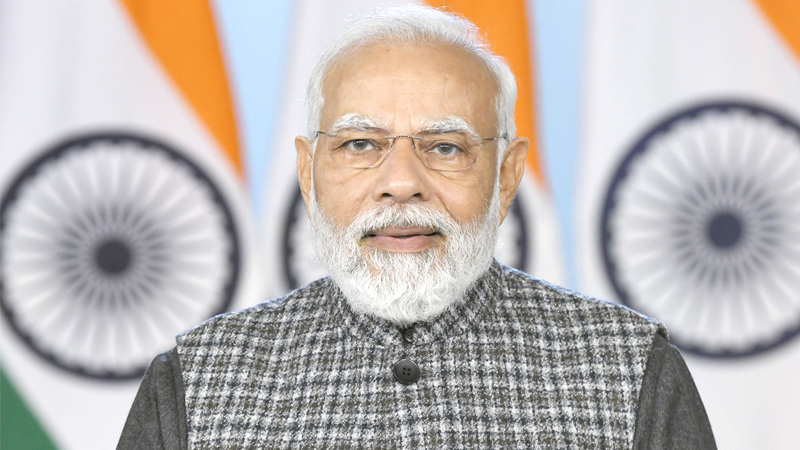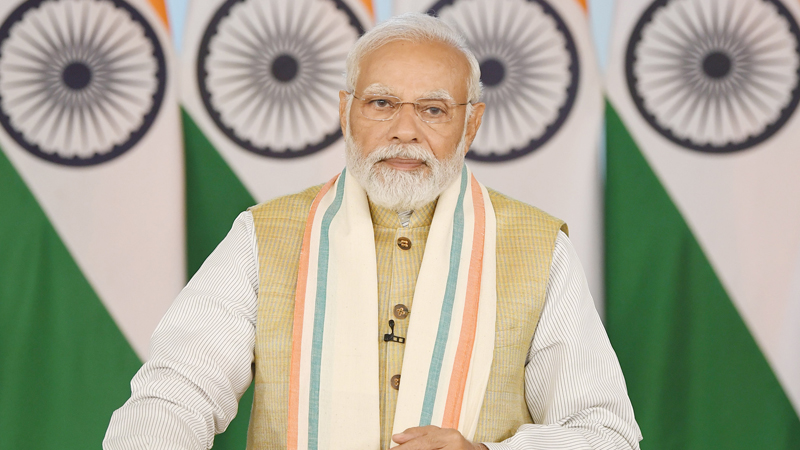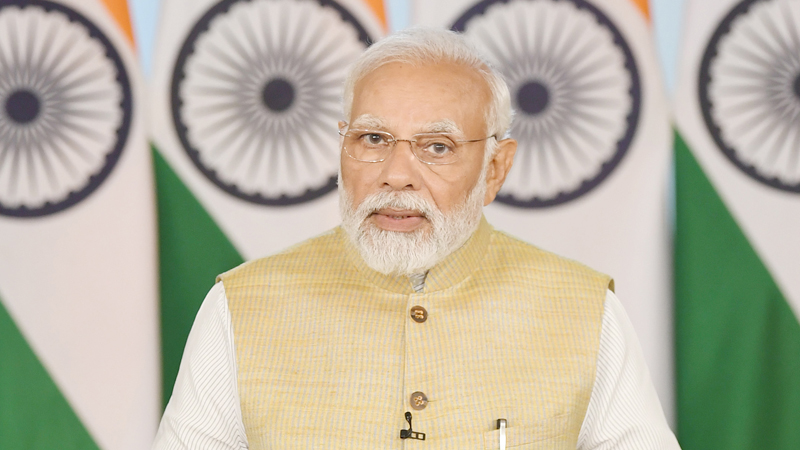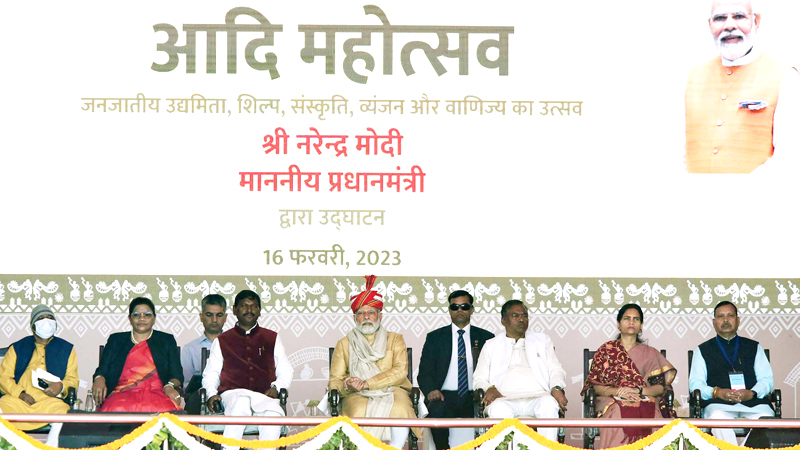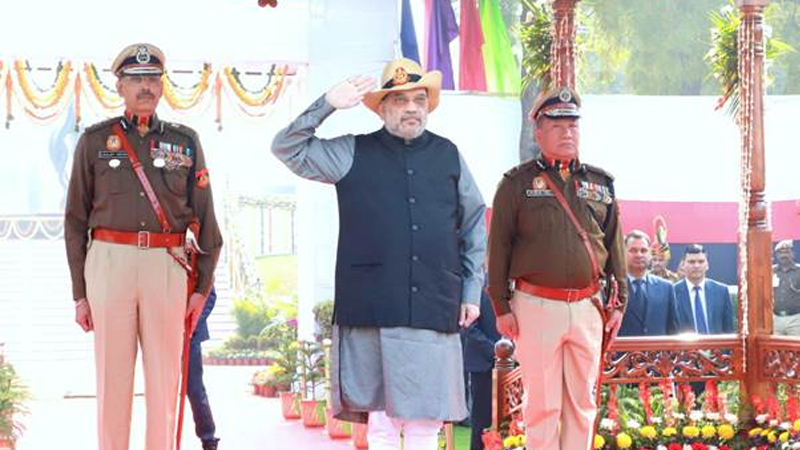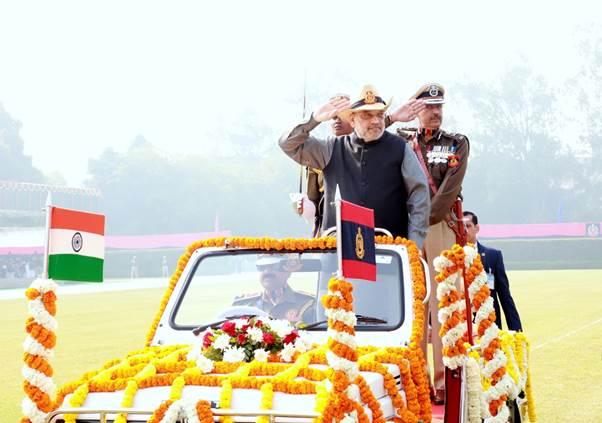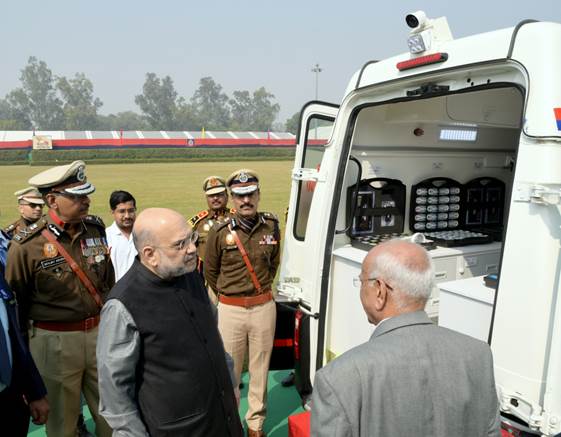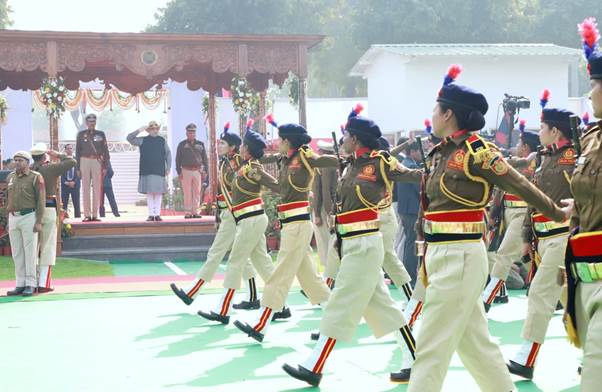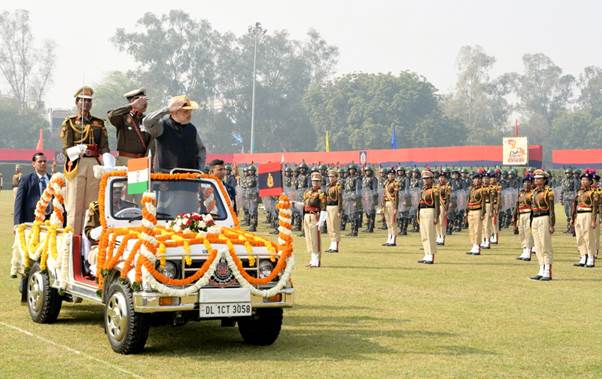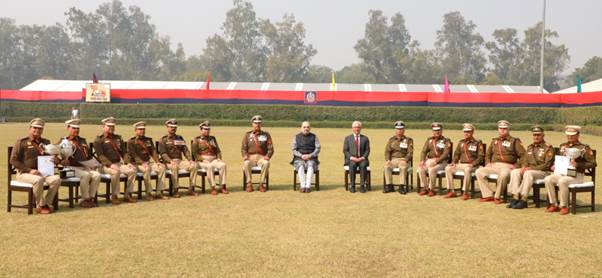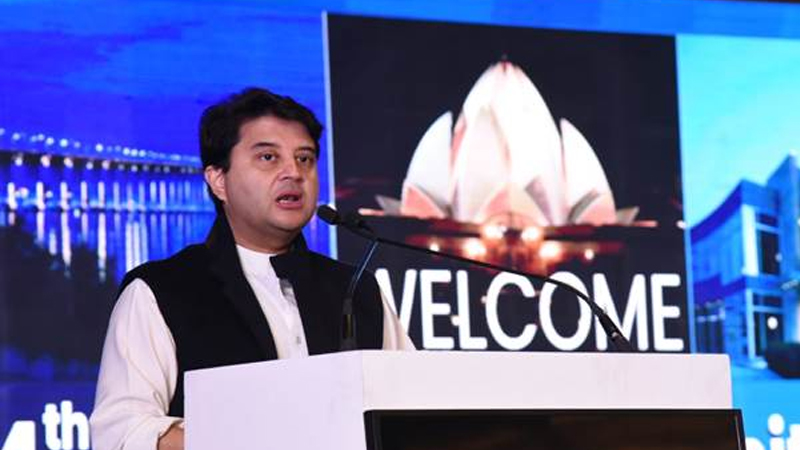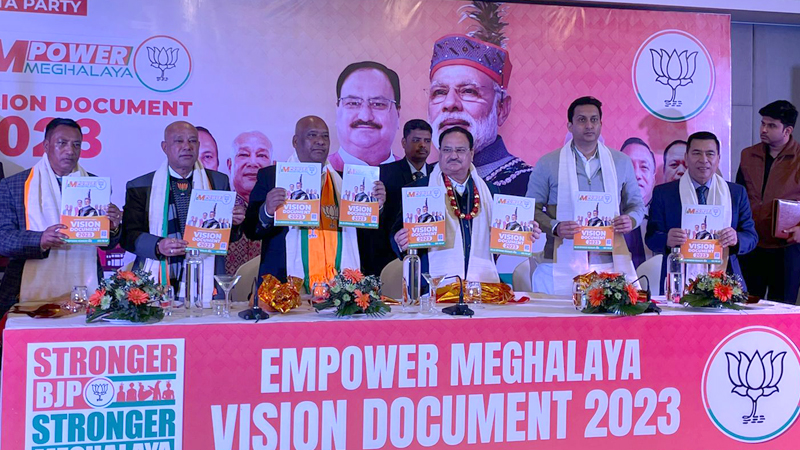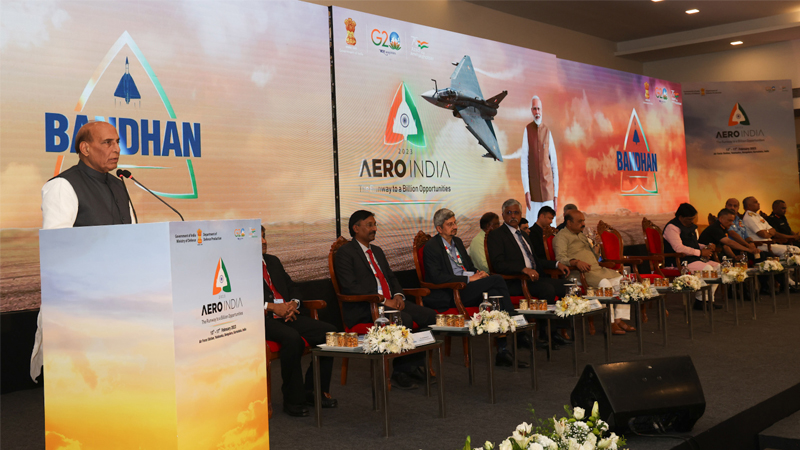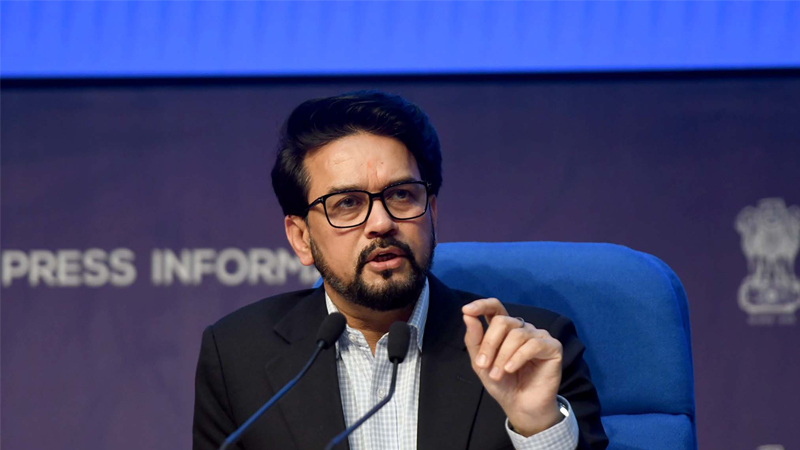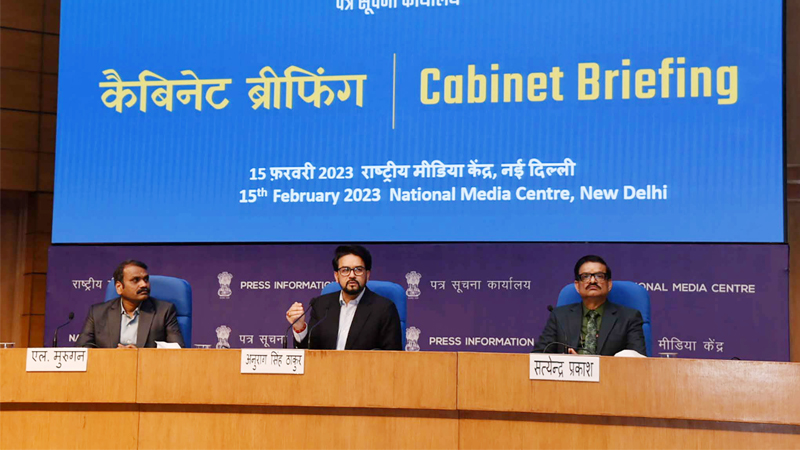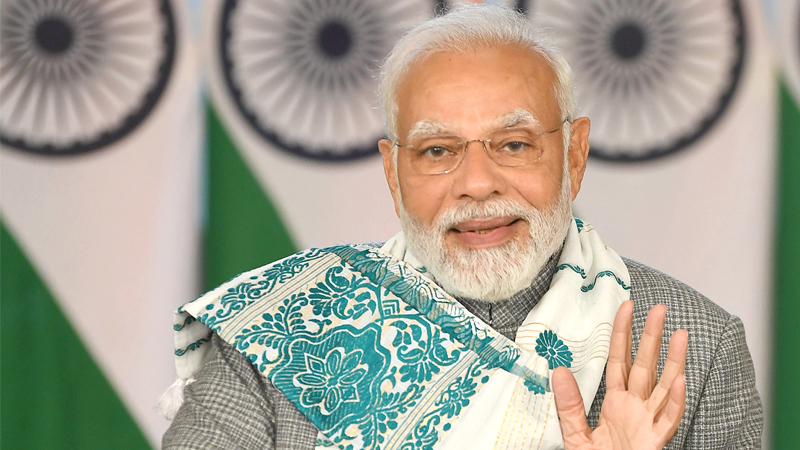The Prime Minister, Shri Narendra Modi inaugurated Aadi Mahotsav, the mega National Tribal Festival at Major Dhyan Chand National Stadium in Delhi today. Aadi Mahotsav is an attempt to showcase tribal culture on the national stage and it celebrates the spirit of tribal culture, crafts, cuisine, commerce and traditional art. It is an annual initiative of the Tribal Cooperative Marketing Development Federation Limited (TRIFED) under the Ministry of Tribal Affairs.
Upon arriving at the venue, the Prime Minister paid floral tributes to Bhagwan Birsa Munda and took a walk-through of the stalls at the exhibition.
Addressing the gathering, the Prime Minister said that Aadi Mahotsav is presenting a grand picture of India’s tribal heritage during the Azadi Ka Amirt Mahotsav. The Prime Minister highlighted the prestigious tableau of the tribal societies of India and expressed delight at getting the opportunity to witness the various flavours, colours, adornments, traditions, art and art forms, delicacies and music. He said that the Aadi Mahotsav represents a picture of the diversity and magnificence of India standing together shoulder to shoulder. “The Aadi Mahotsav is like an infinite sky where the diversity of India is projected like the colours of a rainbow”, the Prime Minister remarked. Drawing an analogy to the colours of a rainbow coming together, the Prime Minister said that the nation’s magnificence comes to the fore when its infinite diversities are threaded into the string of ‘Ek Bharat Shreshta Bharat’ and that is when India provides guidance to the entire world. He emphasized that the Aadi Mahotsav is giving strength to the unity in diversity of India while giving impetus to the idea of development with heritage.
The Prime Minister said that India of the 21st Century is moving with the mantra of ‘Sabka Saath Sabka Vikas. What was considered remote, now, the Prime Minister said, the government is going there on its own and bringing the remote and neglected into the mainstream. He said that events like Aadi Mahotsav have become a movement in the country and he himself participates in many of them. “Welfare of tribal society is also a matter of personal relationship and emotions for me”, said the Prime Minister, remembering his close association with the tribal communities during his days as a social worker. “I have seen your traditions closely, lived them and learnt from them”, the Prime Minister added, remembering spending important years of his life in the tribal belt of Umargam to Ambaji. Tribal life, the Prime Minister continued, “has taught me a great deal about the country and its traditions”.
The Prime Minister emphasized that the country is moving with unprecedented pride with regard to its tribal glory. He informed that the tribal products find a place of pride in his gifts to foreign dignitaries. Tribal tradition is presented by India as an integral part of Indian pride and heritage on global platforms. India, the Prime Minister said, conveys solutions to problems like global warming and climate change in the tribal way of life. The Prime Minister emphasized the tribal community of India has a lot to inspire and teach with regard to sustainable development.
The Prime Minister highlighted the efforts of the government in promoting tribal products. He underlined tribal products should reach the maximum market and their recognition and demand should increase. Giving the example of bamboo, the Prime Minister noted that the previous government had prohibited the harvest and use of bamboo but it was the present government that included bamboo in the category of grass and abolished the prohibition. Elaborating on the Van Dhan Mission, the Prime Minister informed that more than 3000 Van Dhan Kendras have been established in various states. About 90 minor forest products have been brought into the ambit of MSP, 7 times more than the number in 2014. Similarly, the growing network of self-help groups in the country is benefitting the tribal society, he said. There are 1.25 crore tribal members in more than 80 lakh self-help groups functioning in the country.
The Prime Minister emphasized the efforts of the government to promote tribal arts and skill development for the tribal youth. Reflecting on this year’s Budget, the Prime Minister informed that PM Visvakarma Yojna has been introduced for traditional craftsmen where economical assistance will be provided apart from skill development and support in marketing their products.
“Tribal children, be they in any corner of the country, their education and their future is my priority”, said the Prime Minister. He informed that the number of Eklavya Model Residential Schools has gone up by 5 times from 80 schools between 2004-2014 to 500 schools from 2014 to 2022. More than 400 schools have already started functioning, teaching about 1 lakh children. This year’s Budget has announced 38 thousand teachers and staff for these schools. Scholarships for tribal students have been doubled.
Pointing out the hardships faced by the tribal youth due to the language barrier, the Prime Minister threw light on the New Educational Policy where youth can opt to study in their mother tongues. “Our tribal children and youth studying in their own language and progressing has now become a reality”, the Prime Minister said.
The Prime Minister reiterated that the country is soaring to new heights because the government is prioritizing the development of the deprived. He said that the path of progress opens automatically when the country gives priority to the person standing at the last rung. The Prime Minister illustrated this by citing the Aspirational Districts and Blocks scheme where most of the target areas have a tribal majority. “In this year’s budget, the budget given for Scheduled Tribes has also been increased by 5 times as compared to 2014”, the Prime Minister informed and added “The youth who used to get trapped in the trap of separatism due to isolation and neglect, are now connecting with the mainstream through internet and infra. This is the stream of ‘Sabka Saath, Sabka Vikas, Sabka Vishwas and Sabka Prayas’ which is reaching every citizen of the far-flung areas of the country. This is the sound of the confluence of Aadi and Aadhunikta (modernity), on which the soaring edifice of New India will stand.”
The Prime Minister threw the spotlight on the journey of tribal society in the last 8-9 years and said that it has been a witness to the change where the country is giving priority to equality and harmony. He highlighted that this is the first time in 75 years of India’s independence that the leadership of the country is in the hands of a tribal woman who is making India proud at the highest office in the form of President. He said that tribal history is getting much-deserved recognition in the country for the first time.
Underlining the contributions of the tribal society in the struggle for India’s independence, the Prime Minister lamented the veiled attempt for decades to cover up the glorious chapters of the sacrifice and valour in the pages of history. The Prime Minister highlighted that the nation has finally taken the step in the Amrit Mahotsav to bring these forgotten chapters of the past to the fore and said, “For the first time, the country has started celebrating Janjatiya Gaurav Diwas on the birth anniversary of Bhagwan Birsa Munda”. Recalling the opportunity to inaugurate the museum dedicated to Bhagwan Birsa Munda in Ranchi, Jharkhand, he also noted that museums related to tribal freedom fighters are coming up in various states. Even though it is happening for the first time, the Prime Minister said that its impression will be visible for many generations to come and will provide inspiration and give direction to the country for many centuries.
“We have to protect our past, take our sense of duty to the peak in the present, and make our dreams come true for the future”, the Prime Minister remarked as he stated that events like Aadi Mahotsav are a strong medium to take this resolution forward. He emphasized that the campaign should become a mass movement and stressed organizing such events in different states.
The Prime Minister also touched upon the year being celebrated as the International Year of Millets and said that coarse grains have been a part of the tribal diet for centuries. He expressed delight that the taste and aroma of Shri Anna are present at the food stalls of the festival here. He stressed the need to spread awareness about the food of the tribal areas as it will not only benefit the health of the people but also increase the income of the tribal farmers. Concluding the address, the Prime Minister expressed the belief that the dream of a developed India will become a reality with the efforts of everyone put together.
Union Minister for Tribal Affairs, Shri Arjun Munda, Union Minister of State for Tribal Affairs, Smt Renuk Singh Suruta and Shri Bishweswar Tudu, Union Minister of State for Rural Development, Shri Faggan Singh Kulaste, Union Minister of State for Health and Family Welfare, Dr Bharati Pravin Pawar and Chairman of TRIFED, Shri Shri Ramsinh Rathwa were present on the occasion among others.
Background
The Prime Minister has been at the forefront of taking steps for the welfare of the tribal population of the country while also giving due respect to their contributions towards the growth and development of the country. In an effort to showcase the tribal culture on the national stage the Prime Minister, Shri Narendra Modi inaugurated ‘Aadi Mahotsav’, the mega National Tribal Festival at Major Dhyan Chand National Stadium in Delhi today.
The Aadi Mahotsav, which celebrates the spirit of tribal culture, crafts, cuisine, commerce and traditional art, is an annual initiative of the Tribal Cooperative Marketing Development Federation Limited (TRIFED) under the Ministry of Tribal Affairs. It is being organised from 16 to 27 February at Major Dhyan Chand National Stadium in Delhi.
The programme will showcase the rich and diverse heritage of tribes from across the country in over 200 stalls at the venue. Around 1000 tribal artisans will participate in the Mahotsav. Since 2023 is being celebrated as the International Year of Millets, along with usual attractions like handicrafts, handloom, pottery, jewellery etc. A special focus in the Mahotsav will be on showcasing Shree Anna grown by tribals.
